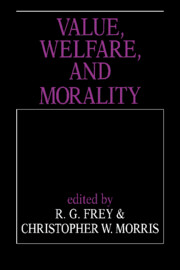Book contents
- Frontmatter
- Contents
- List of contributors
- Preface
- 1 Value, welfare, and morality
- 2 The land of lost content
- 3 Putting rationality in its place
- 4 Can a Humean be moderate?
- 5 Welfare, preference, and rationality
- 6 Preference
- 7 Reason and needs
- 8 Desired desires
- 9 On the winding road from good to right
- 10 Value, reasons, and the sense of justice
- 11 Agent-relativity of value, deontic restraints, and self-ownership
- 12 Agent-relativity – the very idea
- 13 The separateness of persons, distributive norms, and moral theory
- 14 Harmful goods, harmless bads
8 - Desired desires
Published online by Cambridge University Press: 07 December 2009
- Frontmatter
- Contents
- List of contributors
- Preface
- 1 Value, welfare, and morality
- 2 The land of lost content
- 3 Putting rationality in its place
- 4 Can a Humean be moderate?
- 5 Welfare, preference, and rationality
- 6 Preference
- 7 Reason and needs
- 8 Desired desires
- 9 On the winding road from good to right
- 10 Value, reasons, and the sense of justice
- 11 Agent-relativity of value, deontic restraints, and self-ownership
- 12 Agent-relativity – the very idea
- 13 The separateness of persons, distributive norms, and moral theory
- 14 Harmful goods, harmless bads
Summary
A number of philosophers have appealed to “second-order desires” (desires about desires) in order to explain basic moral notions. Harry Frankfurt has suggested that freedom of the will might be identified with the ability to satisfy a certain sort of second-order desire and Richard Jeffrey has made a similar proposal. Gary Watson has objected that the resulting account of freedom of the will does not work and that the appeals made to second-order desires should be replaced with references to what an agent values.
Watson's view can be reconciled with Frankfurt's if valuing is identified with a kind of second-order desire. David Lewis has offered such an identification and David Copp has recently suggested that we might identify a person's values with preferences for which the person has a certain second-order preference.
However, these appeals to second-order desires in order to explain freedom of the will, valuing, or values are all unsuccessful.
In arguing for this negative conclusion, I defend a number of subsidiary points: (1) Positive intentions are reflexive or self-referential. (2) Intrinsic desires are not just noninstrumental desires. (3) To value something is in part to want it. (4) There is sometimes a difference between believing that something is good and valuing it. (5) There is a difference between valuing something and having it as one of your values.
Frankfurt on freedom of the will
Frankfurt motivates his view by criticizing Strawson's account of the concept of a person.
- Type
- Chapter
- Information
- Value, Welfare, and Morality , pp. 138 - 157Publisher: Cambridge University PressPrint publication year: 1993
- 9
- Cited by



